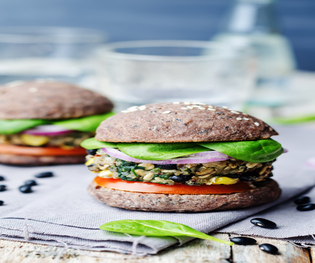Daniel Staackmann, owner and president of Upton’s Naturals, spoke candidly with Jenna Blumenfeld from Supermarket News about veganism and the future of the plant-based meat alternatives.
“I’m a vegan of over 25 years, and seitan was always a favourite food of mine. When I started the company in 2006 there was just one national seitan brand and no one doing it locally. It seemed like a good opportunity that there was room for in the market. I chose not to do tempeh and tofu because they are way more complicated to make, and there are so many regional producers of those protein alternatives,” says Staackmann about the inspiration for starting his company.
While Staackmann’s meat alternatives appeal to himself and vegans alike, all types consumers are enjoying Upton’s alternative meat products to simply reduce their meat intake for dietary purposes. “Less than half are vegan,” says Staackmann. “That’s based off social media posts, consumer events and in-store demos that we have done. It doesn’t seem like we’re 70 percent die-hard vegans and then just 30 part-time vegetarians. It really seems like there are just more and more people trying to reduce the amount of meat in their diets. We think a lot of our customers eat vegan most of the time, and then once in a while they have a steak.”
When asked about food-tech versus old-school ingredients like tofu and seitan, Staackmann favors the old-school approach to the industry but sees how high-tech methods can benefit the industry and be of interest to consumers. “As consumers are drawn to a more vegan diet, they’ll start to explore other alternatives such as seitan. All those big investments and food-tech companies are certainly helping the entire vegan category,” says Staackmann.
In terms of merchandising meat alternatives, Staackmann is aware of the controversy of placing vegan products in the meat aisle—a ongoing industry discussion that’s difficult to ascertain. “There’s been a lot of debate in the industry—is integration better than having the subset somewhere else like in dairy or produce? You would think, yes, if they are in the meat case, maybe you’re going to find that eaters of meat can make decisions to choose vegan protein easier. But consumers of meat alternatives have been pushed into those dairy and produce areas for so long to find vegan products, I wonder if you’re going to lose out on those people. As a longtime vegan, I don’t enjoy going into the meat department to find things. I’m very curious to see what’s going to happen in that regard,” admits Staackmann.
As meat alternative products continue to expand, Staackmann believes that plant-based eating is a decision that more people are likely to turn to. “I just don’t see any reason for anyone in 2017 to say “veganism is ridiculous, why would I do that?” How many studies do there need to be that prove a vegan diet is healthier and better for the environment? Even setting aside the animal rights issues, do you not care about the environment and your own health?” says Staackmann. “There are so many alternatives right now that make it easy to make the transition.”
While Upton’s Naturals is based in Chicago, a selection of their meat alternative products are available to purchase in Canada at vegansupply.ca.







